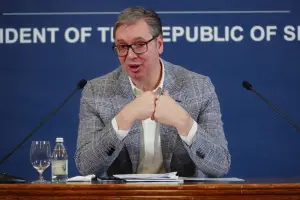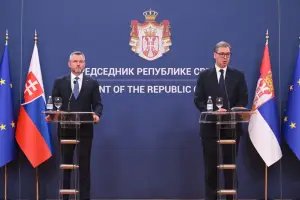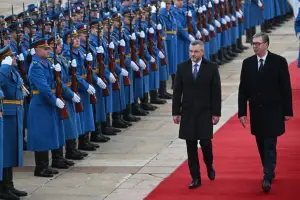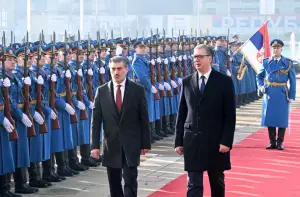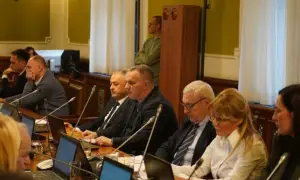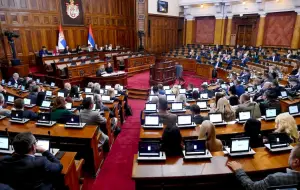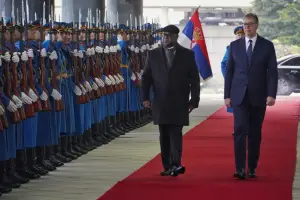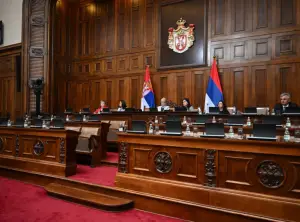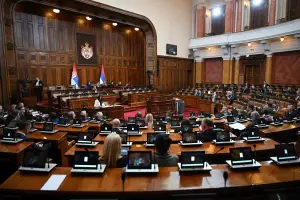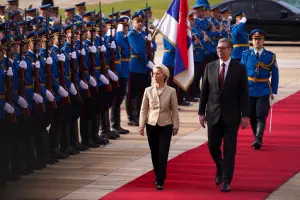Q:
A:
Government took measures to alleviate crisis in time
Belgrade,
26 February 2009
Serbian Prime Minister Mirko Cvetkovic said in parliament tonight that the government took the measures to alleviate the impact of the financial crisis in time.
Replying to MPs’ questions, Cvetkovic said that incentives for the economy amounting to 2.18% of the GDP have been set aside directly from the budget.
Larger incentives in comparison with GDP were set aside only by China and the USA, said the Prime Minister.
He said that last October the government set aside funds to stabilise the banking system, adding that as of this week measures to stimulate economic growth and demand for domestic goods have been initiated.
The Prime Minister explained that the impact of the crisis on the stability of the banking system was first felt in the last quarter of 2008, which is why many citizens raised their savings deposits.
Cvetkovic said the government increased the state-guaranteed savings deposit from €3,000 to €50,000 and abolished the tax on the interest rate for foreign currency savings.
Apart from that, measures were taken to mitigate the effect of the crisis on Serbia’s economic growth, such as subsidised interest rates for liquidity loans, investments and the purchase of domestic products, he noted, stressing that at the same time the government is taking measures to cut expenses in all state sectors.
The Prime Minister said that the first construction stage of the underground gas storage facility Banatski Dvor will be completed before summer, adding that around €50 million will be needed to fill up the storage tanks, as well as around €20 million for infrastructure construction. He noted that the funds will be secured through the National Investment Plan, adding that talks are underway with Germany’s KfW Bank about investment in Banatski Dvor. As for the government’s reaction if the International Court of Justice (ICJ) gives an opinion on the legality of Kosovo-Metohija’s independence contrary to Serbia’s expectations, Cvetkovic voiced his belief it will not come to that.
We strongly believe that the ICJ will make a decision based on legal arguments and we remain optimistic while waiting for its decision, stressed Cvetkovic.
Deputy Prime Minister and Minister of Economy and Regional Development Mladjan Dinkic also replied to MPs’ questions saying that in March the government will come up with a package of additional measures to alleviate the impact of the global crisis, whose goal will be to solve issues related to company liquidity.
Dinkic noted that the good side of the government measures is the fact that minimum budget funds are used for these purposes, since there is no need for them because the Serbian banking system is well-ordered and has enough capital.
One of the largest issues which arose due to the crisis is the fact that banks started granting fewer loans, which implies less spending on behalf of citizens, thus in turn causing lower demand and production, he explained.
This is why the government wants to stimulate banks to grant more loans by subsidising interest rates, Dinkic said, adding that in this time of crisis the state should save as much as possible, whereas citizens should spend as much as they can, according to their capabilities.
He stressed there has been no primary emission of money in Serbia since 2000 and that all revenues are from real sources.
Speaking about the opposition MPs’ objections to the government’s response to the crisis, as well as their criticism of the strategic partnership with Fiat, Dinkic said that at the next elections citizens will decide about that.
He stressed that all government members, headed by Prime Minister Cvetkovic, are ready to render accounts to citizens regarding how they dealt with the crisis at the next elections in 2012, adding that he will not participate in future elections if the new Fiat model, which is to be produced in Serbia, is not launched.
For the first time in years we started making a car in Serbia without any loss, stressed Dinkic, adding that the government entered the deal with Fiat in order to revive the Serbian car industry.
Minister of Finance Dragutinovic stated that Serbia is thinking about closing a new arrangement with the IMF in order to fill up its foreign currency reserves and ensure greater stability of the currency exchange rate.
She stressed the government has not yet resorted to the IMF’s funds since two months is too short a period to assess the real impact of the crisis on Serbia.
Serbia is contemplating a new programme with the IMF. What kind of an arrangement it will be depends on us and the IMF and we will know that in two or two and a half months, said Dragutinovic.
Speaking about effects of the implementation of the Transitional Trade Agreement, she said that it is still too early to determine its effects on revenues from the customs tax and VAT.
Minister of Infrastructure Milutin Mrkonjic responded to a question on projects regarding corridor 10, stating that international investors, especially banks, have announced loans of up to €1.5 billion for these projects, adding it is entirely up to Serbia to determine how fast it will carry them out.
Mrkonjic noted that the government has determined priorities in infrastructure, adding that the majority of work will be completed by mid-2010, except for the Zezelj Bridge, whose completion is planned for 2011.
A total of $400 million has been set aside from the budget for infrastructure projects and as much as RSD 100 million has been allocated to Novi Sad alone, noted the Minister.
The Prime Minister and ministers will respond to MPs’ questions every last Thursday in a month, as set out in the new rules for Parliamentary Procedure.
Apart from the Prime Minister, also present at the parliament session were ministers Bozidar Djelic, Mladjan Dinkic, Slobodan Milosavljevic, Milutin Mrkonjic, Diana Dragutinovic, Verica Kalanovic and Milan Markovic.
Larger incentives in comparison with GDP were set aside only by China and the USA, said the Prime Minister.
He said that last October the government set aside funds to stabilise the banking system, adding that as of this week measures to stimulate economic growth and demand for domestic goods have been initiated.
The Prime Minister explained that the impact of the crisis on the stability of the banking system was first felt in the last quarter of 2008, which is why many citizens raised their savings deposits.
Cvetkovic said the government increased the state-guaranteed savings deposit from €3,000 to €50,000 and abolished the tax on the interest rate for foreign currency savings.
Apart from that, measures were taken to mitigate the effect of the crisis on Serbia’s economic growth, such as subsidised interest rates for liquidity loans, investments and the purchase of domestic products, he noted, stressing that at the same time the government is taking measures to cut expenses in all state sectors.
The Prime Minister said that the first construction stage of the underground gas storage facility Banatski Dvor will be completed before summer, adding that around €50 million will be needed to fill up the storage tanks, as well as around €20 million for infrastructure construction. He noted that the funds will be secured through the National Investment Plan, adding that talks are underway with Germany’s KfW Bank about investment in Banatski Dvor. As for the government’s reaction if the International Court of Justice (ICJ) gives an opinion on the legality of Kosovo-Metohija’s independence contrary to Serbia’s expectations, Cvetkovic voiced his belief it will not come to that.
We strongly believe that the ICJ will make a decision based on legal arguments and we remain optimistic while waiting for its decision, stressed Cvetkovic.
Deputy Prime Minister and Minister of Economy and Regional Development Mladjan Dinkic also replied to MPs’ questions saying that in March the government will come up with a package of additional measures to alleviate the impact of the global crisis, whose goal will be to solve issues related to company liquidity.
Dinkic noted that the good side of the government measures is the fact that minimum budget funds are used for these purposes, since there is no need for them because the Serbian banking system is well-ordered and has enough capital.
One of the largest issues which arose due to the crisis is the fact that banks started granting fewer loans, which implies less spending on behalf of citizens, thus in turn causing lower demand and production, he explained.
This is why the government wants to stimulate banks to grant more loans by subsidising interest rates, Dinkic said, adding that in this time of crisis the state should save as much as possible, whereas citizens should spend as much as they can, according to their capabilities.
He stressed there has been no primary emission of money in Serbia since 2000 and that all revenues are from real sources.
Speaking about the opposition MPs’ objections to the government’s response to the crisis, as well as their criticism of the strategic partnership with Fiat, Dinkic said that at the next elections citizens will decide about that.
He stressed that all government members, headed by Prime Minister Cvetkovic, are ready to render accounts to citizens regarding how they dealt with the crisis at the next elections in 2012, adding that he will not participate in future elections if the new Fiat model, which is to be produced in Serbia, is not launched.
For the first time in years we started making a car in Serbia without any loss, stressed Dinkic, adding that the government entered the deal with Fiat in order to revive the Serbian car industry.
Minister of Finance Dragutinovic stated that Serbia is thinking about closing a new arrangement with the IMF in order to fill up its foreign currency reserves and ensure greater stability of the currency exchange rate.
She stressed the government has not yet resorted to the IMF’s funds since two months is too short a period to assess the real impact of the crisis on Serbia.
Serbia is contemplating a new programme with the IMF. What kind of an arrangement it will be depends on us and the IMF and we will know that in two or two and a half months, said Dragutinovic.
Speaking about effects of the implementation of the Transitional Trade Agreement, she said that it is still too early to determine its effects on revenues from the customs tax and VAT.
Minister of Infrastructure Milutin Mrkonjic responded to a question on projects regarding corridor 10, stating that international investors, especially banks, have announced loans of up to €1.5 billion for these projects, adding it is entirely up to Serbia to determine how fast it will carry them out.
Mrkonjic noted that the government has determined priorities in infrastructure, adding that the majority of work will be completed by mid-2010, except for the Zezelj Bridge, whose completion is planned for 2011.
A total of $400 million has been set aside from the budget for infrastructure projects and as much as RSD 100 million has been allocated to Novi Sad alone, noted the Minister.
The Prime Minister and ministers will respond to MPs’ questions every last Thursday in a month, as set out in the new rules for Parliamentary Procedure.
Apart from the Prime Minister, also present at the parliament session were ministers Bozidar Djelic, Mladjan Dinkic, Slobodan Milosavljevic, Milutin Mrkonjic, Diana Dragutinovic, Verica Kalanovic and Milan Markovic.


